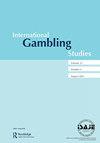Financial speculation in Canada: prevalence, correlates and relationship to gambling
IF 2.5
3区 心理学
Q2 SUBSTANCE ABUSE
引用次数: 3
Abstract
ABSTRACT The purpose of the present investigation was to determine the prevalence, demographic profile, and correlates of financial speculation in Canada, with a focus on its relationship to gambling. In cooperation with Statistics Canada, a brief assessment of financial speculation was developed and included in the 2018 Canadian Community Health Survey (CCHS) and administered to 23,952 adults. The past year national prevalence of financial speculation was found to be 3.6%, with the province of Alberta having the only higher inter-provincial rate. Speculators were predominantly male, White, with a modal age of 30–49, and with higher educational attainment and household income. In terms of health indicators, they were more likely to be regular alcohol drinkers and occasional smokers, but to have better self-reported general health, mental health, and life satisfaction. However, the strongest multivariate predictor of speculation was higher frequency of gambling involvement. Speculators had higher levels of participation in all types of gambling (especially skill-based formats) with the exception of instant lotteries. This high level of involvement contributes to somewhat higher rates of problem gambling symptomatology. The present investigation confirms that speculation not only has a strong conceptual relationship to gambling but also a strong empirical relationship.加拿大的金融投机:盛行率、相关性和与赌博的关系
本研究的目的是确定加拿大金融投机的流行程度、人口特征和相关因素,重点是其与赌博的关系。与加拿大统计局合作,对金融投机进行了简要评估,并将其纳入2018年加拿大社区卫生调查(CCHS),对23,952名成年人进行了评估。去年全国金融投机盛行率为3.6%,阿尔伯塔省是唯一一个省际比率较高的省份。投机者主要是白人男性,年龄在30-49岁之间,具有较高的教育程度和家庭收入。在健康指标方面,他们更有可能经常喝酒,偶尔吸烟,但自我报告的总体健康、心理健康和生活满意度更好。然而,最强烈的多变量预测因素是参与赌博的频率更高。除了即时彩票外,投机者在所有类型的赌博(尤其是基于技能的形式)中都有更高的参与度。这种高水平的参与导致了更高的问题赌博症状率。目前的调查证实,投机不仅与赌博有很强的概念关系,而且也有很强的经验关系。
本文章由计算机程序翻译,如有差异,请以英文原文为准。
求助全文
约1分钟内获得全文
求助全文

 求助内容:
求助内容: 应助结果提醒方式:
应助结果提醒方式:


